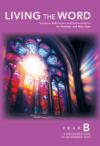Scripture Study for
Third Sunday of Lent
Exodus 3:1–8a, 13–15 / Psalm 103:8a / 1 Corinthians 10:1–6, 10–12 / Luke 13:1–9
<< Back to LECTIONARY RESOURCES
Understanding the Word
By Br. John R. Barker, OFM
As time has gone on, the promise made earlier to Abram that his descendants would inherit the land remains unfulfilled, with Israel now languishing, enslaved, in Egypt. Moses has fled to Midian to escape punishment for killing an Egyptian (Exodus 2:11–15). There he encounters the God of Israel, who affirms that he has not forgotten Israel or divine promises. God remains the “God of the fathers,” and faithful to them and their descendants. Now Moses has been charged with being God’s instrument for fulfilling those promises. Two names of God are given here: I AM, which comes to represent the infinite being of God, and “Lord,” a euphemistic rendering of the divine name that is forever to be remembered in connection with the ancestors: this God is a faithful God.
Paul is warning his Corinthian audience to be wary of falling into a spiritual complacency, in which they presume they have attained salvation simply because they have been baptized. Paul points to the example of Israel, all of whom were delivered from Egypt and thus “baptized.” They all received the same gifts from God in the wilderness, manna and water (here he refers to a rabbinic tradition that the rock from which water sprung “followed” them around so that they always had water). Just as many of that generation nevertheless despised God’s gifts or failed to trust in him, so Christians must be careful not to make the same mistake and reject or deny the gifts God has given to them and fall back into their former ways.
The Gospel reading for this week takes place in the context of Jesus warning his disciples to observe the signs of the times, beginning with his own advent. Now is the time to repent and turn back to God (Luke 12:54–59). In response, some mention certain Galileans who died a terrible death, which Jesus takes as a suggestion that the Galileans were a special kind of sinner more deserving of their death than his audience. Using the story of the tower of Siloam, he points out that no one is sinless and all theoretically deserve to die in the same way. There is no room for complacency. Yet God is patient, albeit not infinitely so. Each of us is like a fig tree that refuses to bear good fruit. Although we deserve to be cut down, God allows Christ (or his ministers) to help the tree to bear fruit. But if it still fails to do so, judgment does await.
